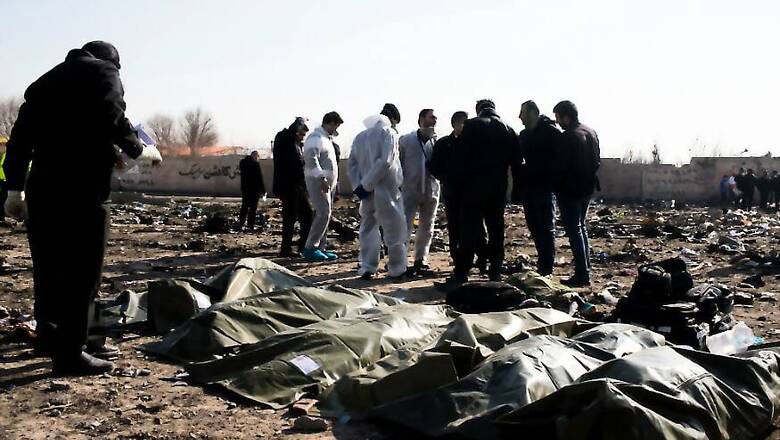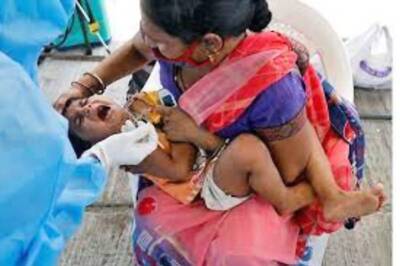
views
Montreal: There was the family of a prominent Iranian writer who had emigrated to Canada a few years ago. There was a newlywed couple. And there were international students and children traveling with their families.
The victims of a crash Wednesday morning of a Boeing 737-800 included passengers and crew members from at least seven countries, among them at least 63 Canadians.
It is unclear what caused the crash.
Ukraine International Airlines Flight 752 went down amid tensions between the United States and Iran over the American drone strike last week that killed Gen. Qassem Soleimani, a key leader of Iran’s Revolutionary Guard. Early Wednesday, Iran attacked two bases in Iraq that house US troops.
The plane was bound for Kyiv and crashed shortly after taking off from Tehran. All 176 people on board were killed.
Vadym Prystaiko, Ukraine’s minister of foreign affairs, said the victims included 82 Iranians and 11 Ukrainians, including nine Ukrainian crew members. Sixty-three passengers were from Canada, 10 from Sweden, four from Afghanistan, three from Germany and three from Britain, he said.
For Canada, the crash was one of the worst losses of life in an aviation disaster. In 1985, a bomb exploded and killed 329 people aboard an Air India flight, most of them Canadians of Indian ancestry.
Canada has one of the world’s largest shares of the Iranian diaspora; 210,000 people who identify as Iranian live in the country, and many of them fled their homeland after the 1979 Islamic Revolution. Others arrived more recently, often drawn by education or employment opportunities.
Iranian immigrants in Canada live largely in the suburbs of the country’s three largest cities — Toronto, Montreal and Vancouver.
Mahsha Alimardani, a doctoral student at Oxford University, wrote on Twitter that the route from Tehran to Toronto, through Kyiv, the Ukrainian capital, had become affordable for many Iranian-Canadians who did not have access to direct flights.
Payman Parseyan, an Iranian immigrant in Edmonton, told the Canadian Broadcasting Corp. that the disaster was “devastating” for the city’s close-knit Iranian community. People were glued to their televisions sets and seeking one another out in search of news about loved ones, he said.
As many as 30 victims came from Edmonton.
Parseyan said they included two young girls, 9 and 14, as well as international students from Iran.
Reza Akbari, president of the Iranian Heritage Society of Edmonton, told The Edmonton Journal that the victims included doctors as well as a newlywed couple, Arash Pourzarabi, 26, and Pouneh Gorji, 25, computer science students who had traveled to Iran for their wedding.
“It’s been a shock,” he told the newspaper. “I know some of these people in person. I had a chance to see them at different parties, gatherings.”
“I can tell you pretty much every Iranian in Edmonton knew some of them,” Akbari said. “So it’s very devastating.”
The crash also took the lives of the wife and daughter of an Iranian author, Hamed Esmaeilion, a dentist celebrated as a leading writer of his generation.
Husband-and-wife engineering professors at the University of Alberta, Mojgan Daneshmand and Pedram Mousavi, and their daughters Daria and Dorina Mousavi, were also killed. The university described Daneshmand as a pioneering researcher in microwave sensors who had been making advances for a variety of products, including wearable health monitors.
In North Vancouver, Arash Azrahimi, owner of Rosewood Photography, said several of the victims had been his customers. Two of them, he said, Mohammadhossein and Zeynab Asadilari, who were in their 20s, were children of a member of the Iranian government and had been living in Vancouver.
Other victims from the Vancouver area included a couple, both doctors, and the wife and daughter of a bakery owner, he said.
Majid Mahichi, a Vancouver-based television producer of a Farsi language program, knew the doctor couple, Firouzeh Madini and Naser Pourshabanoshibi, for 40 years. He said they had gone to Iran to visit their parents and had one daughter, who did not travel with them.
The pair moved to Canada about five years ago, Mahichi said. “They were a very happy couple,” he said. “They were so happy to have moved to Canada.”
He said, “We have some friends who just wanted to visit their families — but now unfortunately, their bodies are coming back.”
Laing O’Rourke, a construction company based in Britain, confirmed in an email on Wednesday that Saeed Tahmasebi Khademsadi, 35, who worked at the company office in Dartford, died in the crash. Tahmasebi, a civil engineer, was a doctoral candidate at Imperial College in London, according to his LinkedIn page.
Sam Zokaei, a reservoir engineer for BP, was also killed, the company confirmed Wednesday. Zokaei, who spoke Arabic and Farsi, was on holiday in Iran and had been with BP for the past 14 years, according to his LinkedIn profile.
At a news conference, Prime Minister Justin Trudeau of Canada said his government would ensure that the incident was fully investigated. “Canadians have questions, and they deserve answers,” he said.
François-Philippe Champagne, Canada’s foreign affairs minister, said he was in touch with the Ukrainian government and that he would keep Canadians informed as the situation became clearer.
“Our hearts are with the loved ones of the victims, including many Canadians,” he wrote on Twitter.
The Canadian Ministry of Foreign Affairs has warned Canadians to avoid nonessential travel to Iran, citing “the volatile security situation, the regional threat of terrorism and the risk of arbitrary detention.”
“Canadians, particularly dual Canadian-Iranian citizens, are at risk of being arbitrarily questioned, arrested and detained,” the travel warning says. “Iran does not recognize dual nationality and Canada will not be granted consular access to dual Canadian-Iranian citizens. Canadian-Iranian dual citizens should carefully consider the risks of traveling to Iran.”
Transport Canada, the country’s transport ministry, said that Air Canada, the only Canadian air carrier that operates in the region, “had altered its routes to ensure the security of its flights into and over the Middle East.”
Dan Bilefsky and Ian [email protected] The New York Times Company




















Comments
0 comment